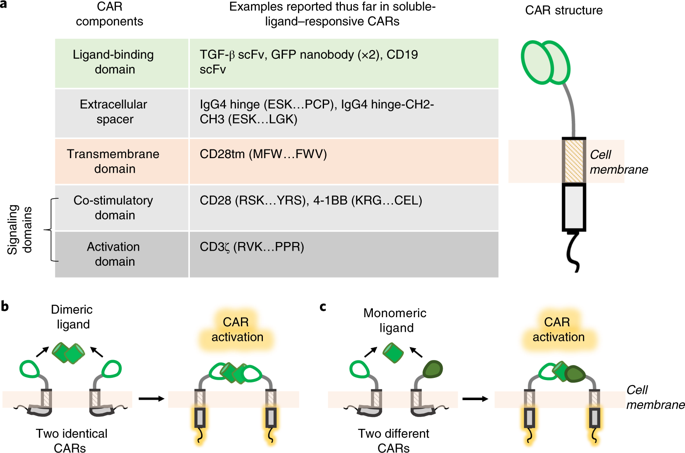当前位置:
X-MOL 学术
›
Nat. Protoc.
›
论文详情
Our official English website, www.x-mol.net, welcomes your
feedback! (Note: you will need to create a separate account there.)
Engineering primary T cells with chimeric antigen receptors for rewired responses to soluble ligands.
Nature Protocols ( IF 13.1 ) Pub Date : 2020-02-26 , DOI: 10.1038/s41596-020-0294-8 ZeNan L Chang 1, 2 , Andrew J Hou 1 , Yvonne Y Chen 1, 3, 4
Nature Protocols ( IF 13.1 ) Pub Date : 2020-02-26 , DOI: 10.1038/s41596-020-0294-8 ZeNan L Chang 1, 2 , Andrew J Hou 1 , Yvonne Y Chen 1, 3, 4
Affiliation

|
The expression of synthetic receptors in primary T cells enables the programming of user-defined responses when designing T-cell therapies. Chimeric antigen receptors (CARs) are synthetic receptors that have demonstrated efficacy in cancer therapy by targeting immobilized antigens on the surface of malignant cells. Recently, we showed they can also rewire T-cell responses to soluble ligands. In contrast to other synthetic receptors, CARs are not only readily engineered by rational design, but also clinically translatable, with robust function in primary human T cells. This protocol discusses design principles for CARs responsive to soluble ligands and delineates steps for producing T cells expressing synthetic receptors. Functional assays for quantifying the ability of CAR T cells to sense and respond to soluble ligands are also presented. This protocol provides a framework for proficient immune-cell researchers to test novel T-cell therapies targeting soluble ligands in <2 weeks.
中文翻译:

用嵌合抗原受体工程化原代T细胞,以便对可溶性配体进行重新应答。
在设计T细胞疗法时,原代T细胞中合成受体的表达可对用户定义的反应进行编程。嵌合抗原受体(CARs)是合成受体,已通过靶向固定在恶性细胞表面的抗原而在癌症治疗中显示出功效。最近,我们证明了它们还可以将T细胞应答重新连接至可溶性配体。与其他合成受体相反,CARs不仅易于通过合理设计进行工程改造,而且在临床上可翻译,在原代人T细胞中具有强大的功能。该协议讨论了对可溶性配体有反应的CAR的设计原理,并描述了产生表达合成受体的T细胞的步骤。还提出了用于量化CAR T细胞感知和响应可溶性配体的能力的功能测定。
更新日期:2020-02-26
中文翻译:

用嵌合抗原受体工程化原代T细胞,以便对可溶性配体进行重新应答。
在设计T细胞疗法时,原代T细胞中合成受体的表达可对用户定义的反应进行编程。嵌合抗原受体(CARs)是合成受体,已通过靶向固定在恶性细胞表面的抗原而在癌症治疗中显示出功效。最近,我们证明了它们还可以将T细胞应答重新连接至可溶性配体。与其他合成受体相反,CARs不仅易于通过合理设计进行工程改造,而且在临床上可翻译,在原代人T细胞中具有强大的功能。该协议讨论了对可溶性配体有反应的CAR的设计原理,并描述了产生表达合成受体的T细胞的步骤。还提出了用于量化CAR T细胞感知和响应可溶性配体的能力的功能测定。











































 京公网安备 11010802027423号
京公网安备 11010802027423号